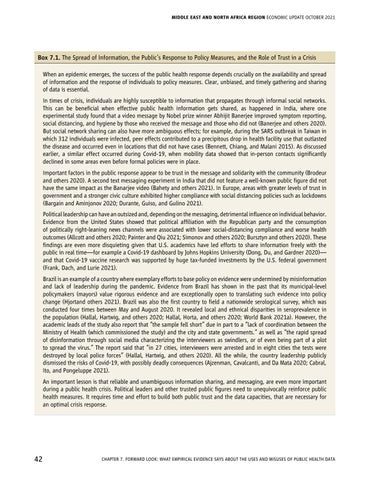MIDDLE EAST AND NORTH AFRICA REGION ECONOMIC UPDATE OCTOBER 2021
Box 7.1. T he Spread of Information, the Public’s Response to Policy Measures, and the Role of Trust in a Crisis When an epidemic emerges, the success of the public health response depends crucially on the availability and spread of information and the response of individuals to policy measures. Clear, unbiased, and timely gathering and sharing of data is essential. In times of crisis, individuals are highly susceptible to information that propagates through informal social networks. This can be beneficial when effective public health information gets shared, as happened in India, where one experimental study found that a video message by Nobel prize winner Abhijit Banerjee improved symptom reporting, social distancing, and hygiene by those who received the message and those who did not (Banerjee and others 2020). But social network sharing can also have more ambiguous effects; for example, during the SARS outbreak in Taiwan in which 312 individuals were infected, peer effects contributed to a precipitous drop in health facility use that outlasted the disease and occurred even in locations that did not have cases (Bennett, Chiang, and Malani 2015). As discussed earlier, a similar effect occurred during Covid-19, when mobility data showed that in-person contacts significantly declined in some areas even before formal policies were in place. Important factors in the public response appear to be trust in the message and solidarity with the community (Brodeur and others 2020). A second text messaging experiment in India that did not feature a well-known public figure did not have the same impact as the Banarjee video (Bahety and others 2021). In Europe, areas with greater levels of trust in government and a stronger civic culture exhibited higher compliance with social distancing policies such as lockdowns (Bargain and Aminjonov 2020; Durante, Guiso, and Gulino 2021). Political leadership can have an outsized and, depending on the messaging, detrimental influence on individual behavior. Evidence from the United States showed that political affiliation with the Republican party and the consumption of politically right-leaning news channels were associated with lower social-distancing compliance and worse health outcomes (Allcott and others 2020; Painter and Qiu 2021; Simonov and others 2020; Bursztyn and others 2020). These findings are even more disquieting given that U.S. academics have led efforts to share information freely with the public in real time—for example a Covid-19 dashboard by Johns Hopkins University (Dong, Du, and Gardner 2020)— and that Covid-19 vaccine research was supported by huge tax-funded investments by the U.S. federal government (Frank, Dach, and Lurie 2021). Brazil is an example of a country where exemplary efforts to base policy on evidence were undermined by misinformation and lack of leadership during the pandemic. Evidence from Brazil has shown in the past that its municipal-level policymakers (mayors) value rigorous evidence and are exceptionally open to translating such evidence into policy change (Hjortand others 2021). Brazil was also the first country to field a nationwide serological survey, which was conducted four times between May and August 2020. It revealed local and ethnical disparities in seroprevalence in the population (Hallal, Hartwig, and others 2020; Hallal, Horta, and others 2020; World Bank 2021a). However, the academic leads of the study also report that “the sample fell short” due in part to a “lack of coordination between the Ministry of Health (which commissioned the study) and the city and state governments.” as well as “the rapid spread of disinformation through social media characterizing the interviewers as swindlers, or of even being part of a plot to spread the virus.” The report said that “in 27 cities, interviewers were arrested and in eight cities the tests were destroyed by local police forces” (Hallal, Hartwig, and others 2020). All the while, the country leadership publicly dismissed the risks of Covid-19, with possibly deadly consequences (Ajzenman, Cavalcanti, and Da Mata 2020; Cabral, Ito, and Pongeluppe 2021). An important lesson is that reliable and unambiguous information sharing, and messaging, are even more important during a public health crisis. Political leaders and other trusted public figures need to unequivocally reinforce public health measures. It requires time and effort to build both public trust and the data capacities, that are necessary for an optimal crisis response.
42
CHAPTER 7. FORWARD LOOK: WHAT EMPIRICAL EVIDENCE SAYS ABOUT THE USES AND MISUSES OF PUBLIC HEALTH DATA

